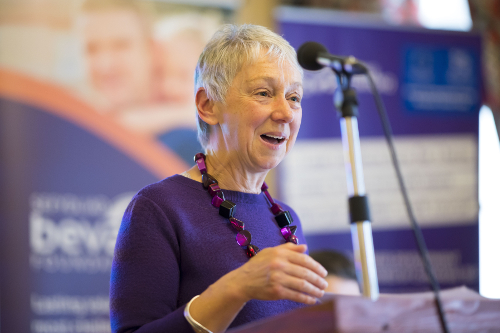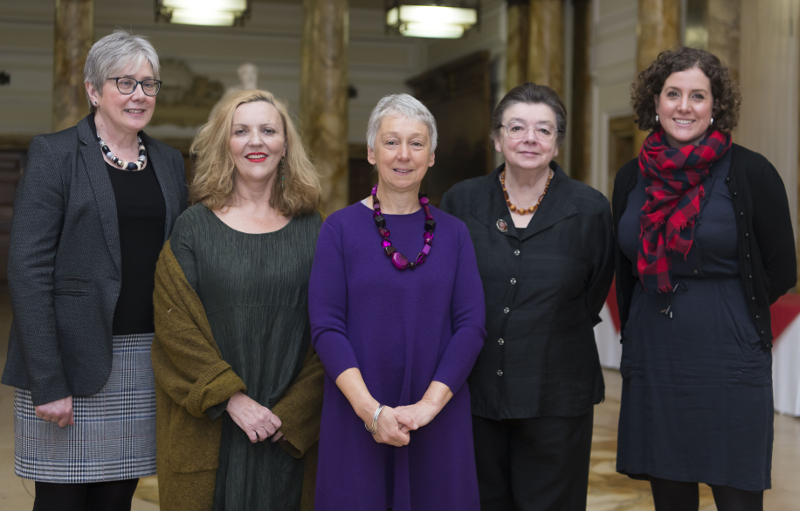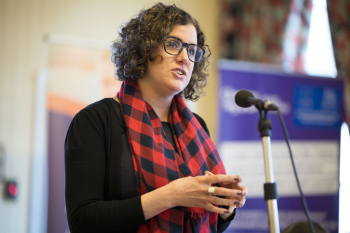 Economy
Economy 
In the week Wales marks both International Women’s Day and National Careers Week, we have hosted our first thought leader talk of 2019 to explore what women want from work and how the Welsh workplace can adapt.

From left: Dr Victoria Winckler, Fiona Stewart, Deborah Hargreaves, Vivienne Sugar and Cerys Furlong
Key speaker at the event was Deborah Hargreaves, a former Guardian and Financial Times editor, who is currently conducting a project on Women in the Workplace in her role as journalist fellow for the Friends Provident Foundation.
This was the first event at which she has presented a public insight into her highly relevant research.
“Women have spent too long fitting themselves into a male pattern of work – one which is increasingly unsuitable for men as well.” said Deborah. As well as the gender pay gap and lack of female representation at board level, there are some deeply ingrained expectations about how women will behave at work: “For reasons of biology, responsibilities and values, women have different requirements of the modern workplace. A workplace set up around these requirements could look quite different to our current one.” But, she explained, this will not happen until we have at least 50% of women represented at all levels of society: “From the House of Commons to company boardrooms, trade unions and management throughout our economy, we need to give women the confidence and power to set their own way of doing things.”
The event, which took place at City Hall, Cardiff, included a panel discussion chaired by Chair of the Bevan Foundation Vivienne Sugar, with director Dr Victoria Winckler, Cerys Furlong, chief executive of the event’s sponsor Chwarae Teg, and Fiona Stewart, CEO and owner of the Green Man Festival.
The event provided a timely opportunity to take stock of the challenges facing employers, women and men at work, and hear some thought-provoking and shocking insights. Following a pre-event survey, Victoria provided a flavour of just some of the experiences women have to content with at work:
- 53% of respondents said they had been mistaken as an assistant to a man
- A whopping 72% had been told they were ‘aggressive’ or very bold
- Half had overheard or received comments about women being on their periods or going through the menopause
- 47% had been paid less than some of the opposite gender for undertaking a similar role
- 44% had been criticised for being too emotional or sensitive
- 37.5% had been made to feel bad for taking time off to care for children
- 31% had overheard or received gender-related comments when making requests, such as ‘isn’t that your wife’s job?’
- 28% had been left out or had important meetings scheduled on days they don’t work
- 27% had been asked if they were planning to have children
- 19% had been refused a request for flexible working
- 19% had been excluded from work “perks” or benefits because of their working pattern or gender
- 15.6% had been passed over for training or promotion for reasons related to their gender
On the positive side, the event provided a chance to ask what women want from the modern workplace and explore new solutions to increase gender equality in Wales.
Deborah explained that the first step to create greater gender equality in the workplace is to get more women into leadership positions. It’s this that will enable the necessary cultural shift. Cerys Furlong echoed these comments saying:
“Women leaders generally do things differently – we reflect more, we listen and learn from our experiences, we tend to run less hierarchical organisations and we have a more planned aproach to risk.”
All panellists agreed that workplaces need to better understand women’s specific needs. By recognising they have different requirements than men and not expecting them to perform and react the same, employers can make roles more appealing and suitable for women.
“Caring is such a big part of our lives… It’s probably the most important job any of us will do, so why is work not organised around it?” said Deborah.
Other suggestions put forward included:
- Make flexible working options available to everyone so women aren’t seen to be getting ‘special treatment’; inclusivity is key
- Be more open to job-share options
- Provide leaders with mandatory gender equality and unconscious bias training
- Actively encourage women’s voices by ensuring everyone has a chance to speak in meetings
- Have prominent male gender equality champions in work
- Improve education of the menopause and HR policies that support women to stay in employment
- Challenge and fight discriminatory practices e.g. meetings at inappropriate times, challenging those who interrupt women, talk over or try and drown out quieter voices
Recent research by Chwarae Teg indicated that almost £14bn could be added to the Welsh economy by 2028 if Wales achieves full gender equality.
 Panellist Cerys Furlong (pictured left) said:
Panellist Cerys Furlong (pictured left) said:
“Gender equality is not a ‘nice to have’, it’s an economic imperative. Evidence shows that greater diversity leads to better decision making, increased productivity and improvements in staff retention and recruitment.”
 Fiona Stewart (right) said gender equality is an ethos she instils strongly within Green Man and one that is supported by the whole team.
Fiona Stewart (right) said gender equality is an ethos she instils strongly within Green Man and one that is supported by the whole team.
“Gender parity matters a great deal to me, but I see it as part of a wider conversation identifying any situation where people use difference as an excuse to exclude or behave unfairly.”
The Bevan Foundation is working hard to ensure that everyone in Wales, regardless of their characteristics, can flourish and fulfil their potential, both personally and professionally. By seeking to understand the root causes of inequality we can develop practical solutions and persuade the relevant decision-makers to take action and create lasting change.


